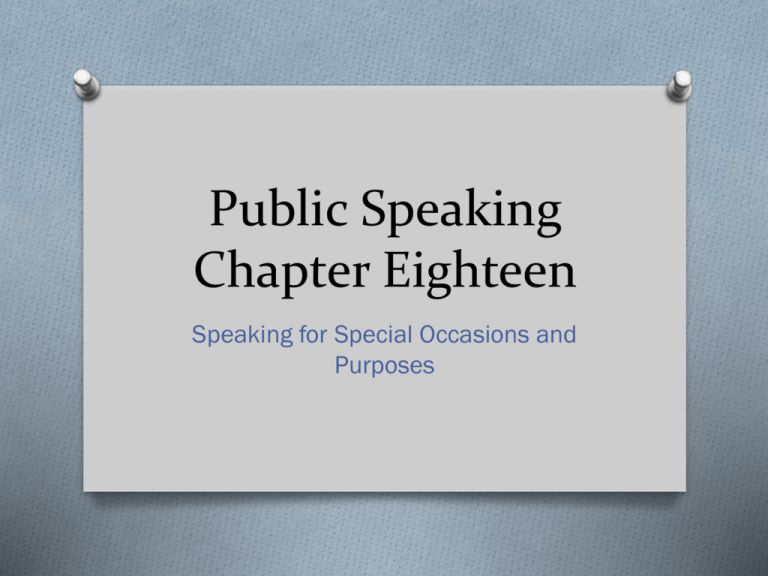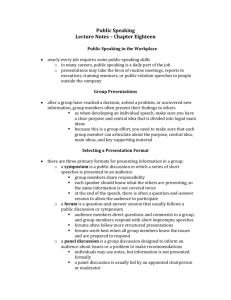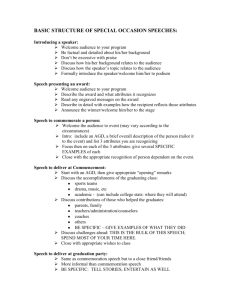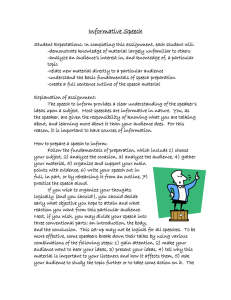Public Speaking Chapter Eighteen
advertisement

Public Speaking Chapter Eighteen Speaking for Special Occasions and Purposes Public Speaking in the Workplace O nearly every job requires some public- speaking skills O in many careers, public speaking is a daily part of the job O these can take the form of: O management meetings O reports to company executives O training seminars within the company O public-relations speeches to people outside the company Group Presentations O after a group has reached a decision, solved a problem, or uncovered new information, group members often present their findings to others O make sure you have a clear purpose and central idea, divided into logical main ideas Group Presentations O there are three primary formats for group presentations: O symposium – a public discussion in which a series of short speeches is presented to an audience O each speaker should know what the others will present to avoid presenting the same material twice O at the end, the audience may participate in a question-and-answer session Group Presentations O forum – a question-and-answer session that usually follows a public discussion or symposium O often follows a more structured presentation O forums work best when all group members know the issues and are prepared to respond O panel discussion – a group discussion designed to inform an audience about issues or a problem or to make recommendations O individuals on the panel may use notes on key facts or statistics, but they do not present formal speeches O panel discussions are often followed by a questionand-answer period – or forum Group Presentations O Suggestions when planning a group presentation: O make sure group members understand the task or O O O O O assignment and work together if your assignment is to solve a problem or to inform the audience, try brainstorming to develop a topic or question give group members individual assignments develop a group outline and decide on an approach rehearse incorporate principles and skills of effective audience-centered public speaking when giving the group presentation Group Presentations O keep these tips in mind when you are offering conclusions or recommendations: O clarify your purpose O use presentation aids effectively O choose someone to serve as moderator or coordinator O can provide needed structure and keep the group on time O be ready to answer questions Public-Relations Speeches O public-relations speeches are designed to inform the public, to strengthen alliances with them, and in some cases, to recommend policy O first, discuss the need or problem that has prompted the speech O then, explain the how the company or organization is working to meet the need or solve the problem (or why it believes that there is no problem) Public-Relations Speeches O it is important to anticipate criticism O emphasize the positive aspects of the policy or program O do not become defensive O leave the impression that the company or organization has carefully worked through potential pitfalls and drawbacks Ceremonial Speaking O kairos is the circumstances surrounding the occasion for a speech O a ceremonial or epideictic speech is delivered on special occasions for celebration, thanksgiving, praise, or mourning Introductions O a speech of introduction is a speech that provides information about another speaker O like an informative speech, the speaker is delivering the information to the audience about the main speaker O be brief – the audience is there to hear the speaker, not you O be accurate – know how to pronounce the speaker’s names and other terms you will need to know O keep the needs of your audience in mind – if the speaker needs no introduction, don’t give one – just offer a warm welcome Toasts O a toast is a brief salute to a momentous occasion O the modern toast is short – only a few sentences O sincerity is more important than wit Award Presentations O a presentation speech is a speech that accompanies the presentation of an award O first, refer to the occasion of the presentation O second, talk about the history and significance of the award O lastly, give the award O if the person knows they are getting the award, you can refer to them in their speech O if it is a surprise, save the drama of the actual announcement until the last moment Nominations O nomination speeches officially recommend someone as a candidate for an office or position O the person making the nomination should explain clearly why the nominee’s skills, talents, and past achievements serve as qualifications for the position Acceptances O an acceptance speech gives thanks for an award, nomination, or other honor O usually have a bad reputation because of lengthy, boring, and rambling examples seen on television award shows O formula O first, thank the person making the presentation and the organization he or she represents O second, comment on the meaning or significance of the award to you O lastly, try to find some meaning the award may have for your audience Keynote Addresses O a keynote address is a speech that sets the theme and tone for a meeting or conference O emphasizes the importance of the topic or the purpose of the meeting, motivates the audience, and sets the theme for other speakers or events Commencement Addresses O a commencement address is delivered at a graduation or commencement ceremony O praise the graduating class O turn graduates toward the future O this is not the proper forum to discuss the problems in the world, instead focus on the bright and inspiring futures ahead of the graduates Commemorative Addresses and Tributes O commemorative addresses are speeches delivered during ceremonies held in memory of some past event and / or the person or persons involved O present some facts about the event and / or the people being celebrated O build on those facts, urging the audience to let past accomplishments inspire them to achieve new goals Eulogies O a eulogy is a speech of tribute delivered when someone has died O you should mention – and linger – on the unique achievements of the person to whom you are paying tribute O express a sense of loss O turn to the living, and encourage them to transcend their sorrow and feel instead gratitude that the dead person was once alive and among them After-Dinner Speaking: Using Humor Effectively O an after-dinner speech is an entertaining speech, usually delivered in conjunction with a mealtime meeting or banquet O they can persuade or inform, but their primary O O O O purpose is to entertain think about what audiences find funny be careful of potentially sensitive or inappropriate topics humorous stories should be simple know your anecdotes very well (forgetting things always ruins the joke) Humorous Verbal Strategies O a pun is the use of double meanings to create humor O a spoonerism is a phrase in which the initial sounds of words are switched (“sublic peaking” instead of “public speaking”) O used to avoid libel charges or copyright infringement O a malapropism is the mistaken use of a word that sounds very much like the intended word Humorous Verbal Strategies O an hyperbole is an exaggeration O an understatement is downplaying a fact or event O verbal irony is saying the opposite of what one means O wit is relating an incident that takes an unexpected turn at the end Humorous Nonverbal Strategies O posture O gesture O voice O well-timed pauses





